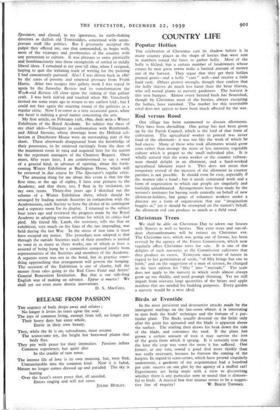Rod versus Rood
Our village has been summoned to discuss allotments. They have been dwindling. One group has just been given up by the Parish Council, which is the lord of that form of cultivation. The agricultural worker in general was never fond of the allotment : it was too like the work of which he had excess. Many of those who took allotments would grow corn rather than attempt the more or less intensive vegetable culture which is proper to the small individual plot. It is wholly natural that the town worker or the country railway- man should delight in an allotment, and a hard-worked agricultural labourer reject it. This does not mean that temporary revival of the increase of the allotment in country parishes is not possible. It should even be easy, especially if the women take a hand ; but it needs communal work and a form of organisation to which our people are singularly and foolishly unhabituated. Arrangements have been made by the women's institutes for buying seeds centrally on behalf of new allotment-holders, but gangs of volunteer workers under a director are a form of organisation that our " imagination boggles at," yet it should be attempted on the nation's behalf. An allotment rod can produce as much as a field rood.




































 Previous page
Previous page